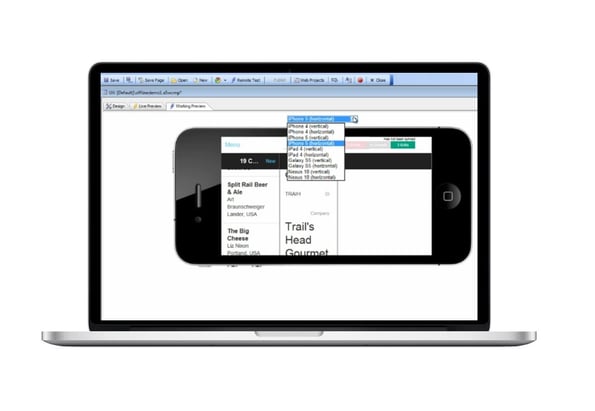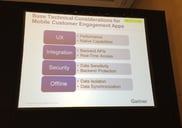 Software developers and citizen developers must create applications faster -- hand-coded apps aren't fast enough. One method is using low-code application development and deployment. Low-code development platforms build applications without having to write code but let you write code when you need it. Let's discuss why companies are automating with low-code, why investment in low-code is growing and the benefits that low-code rapid application development brings to enterprise digital transformation.
Software developers and citizen developers must create applications faster -- hand-coded apps aren't fast enough. One method is using low-code application development and deployment. Low-code development platforms build applications without having to write code but let you write code when you need it. Let's discuss why companies are automating with low-code, why investment in low-code is growing and the benefits that low-code rapid application development brings to enterprise digital transformation.
What Types of Apps Do Businesses Need?
Mobile enterprise apps are increasingly task-oriented experiences that are integral parts of business ecosystems. Often developed by tech-savvy analysts with little professional programming support, these apps enhance employee effectiveness and productivity. With these apps, companies can increase profits, cut costs and drive business value by mobilizing essential work activities.
Task-oriented apps reduce the friction of time delays and disconnected steps in business processes. They provide workers with mobile experiences to complete necessary activities. Here are examples of low-code task-based apps:
-
American Pool manages lifeguards at 3000 commercial pools across the US. The company built a smartphone app for its lifeguards that speeds scheduling and shift swapping. The low code app recognizes their locations, process automation to clock their hours, and seamlessly connects to the enterprise time-tracking system. The app supports shift scheduling and swapping.
-
Zerock, a construction company with projects across Africa, recently built powerful low code construction apps. Project managers can review and approve payment requests for tasks completed and goods delivered from a user interface on their smartphones. They sign and date the transactions using official signatures stored on their devices.
Hand Coding is Slowing Developers

Developers used to build massive business apps with native code. Requirements gathering, prototyping, development, and testing would take months.
These complex applications did a large number of tasks, from data collection to workflow to information sharing. Often, many departments or processes would work off one application. Mobile phones have changed the game.
Now mobile phone users want to immediately get into an app, complete a simple task in minutes, then leave the app. They want:
- apps that are built for small screens and one-handed data entry
- user interfaces that are intuitive and take seconds to learn
- apps built for specific tasks
- to save time previously spent hunting for a specific function in an overwhelming and complex app.
Companies Need More Mobile Apps
 Before, developers could build one massive desktop app to do many tasks on a large computer screen. Now they must build many separate task-based apps to do a number of processes.
Before, developers could build one massive desktop app to do many tasks on a large computer screen. Now they must build many separate task-based apps to do a number of processes.
Native development doesn't make sense for these very task-focused mobile apps.
-
Business users can't wait months for native code to be developed for apps on iOS, then on Android.
-
Developers must be able to quickly create mobile apps then move on to the next urgent business need.
-
The best code should be shared across apps and not conceived from scratch every time.
-
Routine capabilities should be built-in so that developers don't have to start from scratch every time.
-
Mobile devices change quickly. Apps run flawlessly as new tablet and smartphone models are rolled out.
Low code development tools are the answer.
Why Low Code Software Use is Increasing
 In recent blogs, I've pointed to analyst research and IT surveys that show low-code investments are growing. For example:
In recent blogs, I've pointed to analyst research and IT surveys that show low-code investments are growing. For example:
-
Gartner says the low-code/no-code market will hit $13.8 billion this year, up 22.6% from last year.
-
Gartner predicts that business app developers will soon outnumber professional developers in organizations by 4-to-1.
-
Gartner predicts that business app developers will soon outnumber professional developers in organizations by 4-to-1.
-
Venture capitals are investing more in no-code/low-code platforms.
What are Low Code Development Platforms?
Benefits of Low-Code Development Platforms
 Whichever low code application platform you select, your business will reap many benefits. When adopting low code technology for building and deploying business apps, companies can expect to:
Whichever low code application platform you select, your business will reap many benefits. When adopting low code technology for building and deploying business apps, companies can expect to:- Develop more apps faster
- Deliver apps tailored to users' unique needs
- Keep the business agile in competitive markets
- Include best practices in apps
- Increase productivity of users across the organization.
Read more about the pros and cons of low code development
How Low-Code Development Platforms Help Business

What are the business benefits of a low-code development platform? In today’s digital age, mobile work is a fact of business life. Companies must leverage their investments in web-based applications. They must enhance and extend the capabilities of their underlying IT systems.
Simply shrinking desktop applications to fit on smartphone screens is not an acceptable user experience. Analysts and developers need to identify the critical steps in business processes and mobilize high-value tasks. It is essential to consider the entire business ecosystem.
This is where a low-code platform that easily builds custom apps makes the difference. It expedites the development of task-oriented custom apps for professional developers. A low-code development environment delivers rapid app development; integration with backend systems; connections to remote web sources; and offline apps.
Why Businesses Must Adopt Low-Code Development To Survive
 The drumbeat towards the use of low-code/no-code software continues, most recently with a Gartner analyst warning that businesses must “automate or die.” That automation, he says, needs to be done with low-code/no-code platforms rather than traditional software.
The drumbeat towards the use of low-code/no-code software continues, most recently with a Gartner analyst warning that businesses must “automate or die.” That automation, he says, needs to be done with low-code/no-code platforms rather than traditional software.
That’s the essence of Gartner analyst Milind Govekar’s presentation at the recent Gartner IT Symposium, according to The Register. The newspaper sums it up this way: “Gartner analyst Milind Govekar believes that application development is moving to ‘low code or no code,’ and software development shifting to ‘assembly and integration.’”
The core of his argument is that programmers will eventually no longer write entire applications from scratch. Here’s how the Register explains it: “Govekar argues that ‘application development will shift to application assembly and integration ... in 2025 you will develop composable applications by assembling and integrating package-based capabities.’ This will "fuel the continued growth of API marketplaces,’ he said. API access to SaaS (software as a service) is increasing such that ‘by 2025, the boundaries between SaaS and PaaS [platform as a service] will disappear.’"
The assembly, he believes, will largely be done by people using low-code/no-code platforms. Here’s how the Register puts it: “Composing such applications will be easier than traditional development, thanks to increasing use of low-code or no-code techniques, enabling ‘business technologists’ to be developers.
Govekar believes this approach will form 70% of new applications. ‘Applications of the future will be assembled and composed by the people that actually use them,’ he said. He even used the dreaded catchphrase ‘citizen development,’ which he assured virtual listeners ‘will transform the scale and the economics of application development and software engineering.’"

This means that the lines between IT and business units will blur. And it also means that increasingly, business users rather than professional developers will be at the forefront of app development. That will be made possible by the increased use of low-code/no-code platforms.
He put it this way: "Once in production, applications should be immutable, with changes being driven by development … automate or die."
His predictions echo those of Gartner distinguished VP, and analyst on software design and development Jason Wong. At the same symposium, Wong said that businesses need to use “hyperautomation” if they are going to thrive in today’s and tomorrow’s markets – and that low-code/no-code development platforms are vital.
Use This Low Code Development Platform for Free
Want to see if low code development is right for you?
The Alpha Anywhere low code app development platform rapidly creates cloud-based mobile apps and offers a free community version. These secure apps easily access and integrate with any database or web service and work offline. This platform also includes many of the capabilities and benefits we listed above. Make an App: access the industry's best low code app development platform and free app templates.







Comment